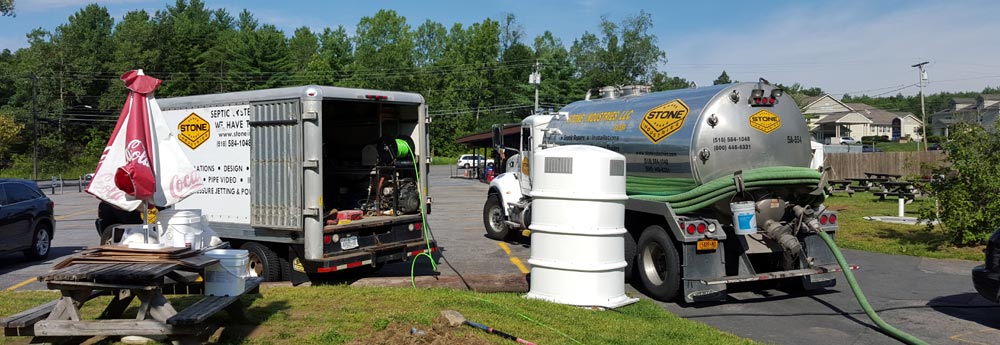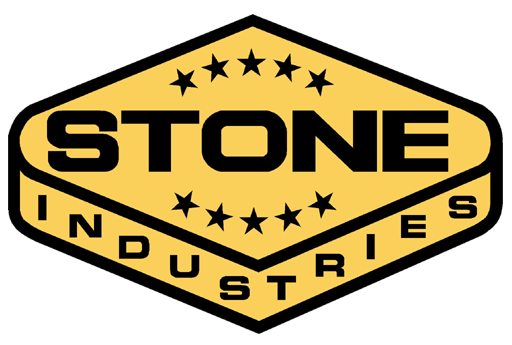
Should my septic tank be full when I open the cover?
It should be close to the top, but not coming out the lid. You should be able to see the complete inlet or outlet pipe at, or above the liquid level, but it should be very near the top. If the level is over the inlet or outlet pipes, then you have a drainage problem and you should call us.
Can I drive over my septic field? What about the septic tank?
Generally no. Lawn tractors are okay, pretty much everything else is not. If you drive a pickup with a load of wood over your drain field you risk serious damage to the system. Please don’t drive your boat and trailer across it either. Septic tanks should also not be driven across unless they are installed with a traffic bearing cover.
What does the little pipe sticking out my roof do?
It’s the vent pipe for your home’s plumbing. It should keep any odors from your home. If it gets blocked or if prevailing winds blow the smell back down around the house, call us. There are charcoal filters available to keep odor in check.
Can I flush old medicine down the drain?
No. Especially not antibiotics. Antibiotics kill bacteria and septic tanks rely on bacteria to function. Old medicines can kill your system even faster than excessive bleach.
How many loads of laundry can I do every day?
One load per day per bedroom would be a maximum limit. Try to keep it to less and make sure you spread your laundry out over the week to avoid shock-loading your septic system.
Can you help me located my septic tank?
Sure. If you cannot find your tank using the technique mentioned above, our technicians can probably find it for you with a probe they carry on the trucks. If this does not work we also offer an electronic locating service with a flushable transmitter for a nominal fee.
My tank has a broken cover, what can I do about it?
Tank covers deteriorate over time and eventually break. They can be replaced with new concrete covers or a plastic riser cover. Please call the office to discuss your options.
Will a ride-on lawn mower hurt my drain field?
No. Ride-on mowers and other garden care equipment will not harm your leach field. You should, however, stay away from it with cars, pick-up trucks, and rubber tired heavy equipment like backhoe loaders.
Do you offer group discounts?
Yes. Please call our office to discuss your particular situation and let us create a custom proposal for you. We currently work with many homeowner’s associations, lake associations, condominiums, and mobile home parks and would love to add your group to our list of satisfied customers.
Do you offer scheduled service or a reminder system?
We offer both. Depending on your circumstances we can set your account up to receive service on a regular schedule with no further action required on your part, or we will call and remind you when service is due on your system and you can decide when you would like it performed. We also send our residential customers reminder postcards to let you know when service is due.
Why is the grass greener over my leach field?
Drainage fields provide a constant supply of water and “fertilizer” and create a perfect environment for growing healthy grass.
What can I plant over/near my leach field?
Grass is best, but any plants and flowers with shallow root systems can be planted. Avoid planting food crops for the sake of your own health and avoid plants or trees with significant root systems as these will block up your drain field (this is known as root infestation).
Can I install an above-ground swimming pool over my leach field?
Absolutely not. This will significantly impact your drainage and guarantee you problems down the road. Do not ever install anything permanent over your drainage area, including garden sheds and workshops.
Can I install a deck over my septic tank?
Generally, no. If you do, make sure you leave the outlet side of the tank accessible for service and be sure not to break the tank when setting your footings.
Are bacterial/chemical septic tank treatments a substitute for routine pumping?
No. While treatments can improve the bacterial action in the tank, they will not deal with the bacteria’s waste (sludge) or the greasy layer that forms on the top of the tank (scum). These layers need to be removed every couple of years by having your septic tank pumped.
What is the difference between a leach field and a drywell?
A leach field is a series of long thin pipes or plastic chambers installed in parallel lines. Each line is typically 50’ long and a leach field generally has between three and six of these laterals. A drywell is a large perforated pre-cast concrete cylinder surrounded by crushed stone. Drywells are not typically installed these days due to groundwater separation requirements (they go too deep in the ground).
Are water softeners safe? What about garbage disposals?
Both are safe as long as the rest of your septic system is functioning properly. They do both add an additional strain on your system, so you should have your tank pumped every two years to help maintain your system. Also, much of the stuff you put down the garbage disposal will not break down in your septic tank, so try not to use it aggressively. Coffee grounds should never be put through the disposal.
How important is the outlet baffle in my septic tank?
Probably the most important part of the whole septic system. If it is missing or damaged, you must have it replaced. The outlet baffle protects the drain field from getting clogged up with the solids in the septic tank. Without it your drain field will fail, leading to a very expensive repair.
Why is there a wet spot in my yard?
Wet spots indicate a drain field that is not handling all the wastewater going into it. If you have been using an excess amount of water, have your septic tank pumped and watch your water usage. If it comes back you will need to call us for a free estimate on repairing or replacing your drainage system.
Should I get any smell from my septic system?
When they are functioning normally septic systems have no smell. If you have any bathrooms, sinks, or drains, that you do not generally use, try running water through all of them to fill up empty P-traps. If that does not solve the problem, check your vent stack (the little pipe going through your roof) to see if there is a clog.
What is that gurgling noise I hear in my pipes?
Gurgling occurs when air is pulled through the pipe along with the water being drained away. You can generally ignore it unless it is accompanied by other symptoms like a slow draining toilet or backed up sink
Where is my septic tank located?
Go down to your basement and find where the main drain exits through the foundation (it will generally be a four inch cast-iron or PVC pipe). Go outside and measure 11’ out from the foundation of your home in the spot the pipe goes through the wall. Generally your inlet cover will be located here about 6″ to 2′ underground.
What kind of cleaners can I use?
You can use all types of cleaners in your home; just try not to go overboard with the amount. Remember, your septic tank needs bacteria to work and most cleaners are anti-bacterial. The tank can regenerate the bacteria it needs, but only if you don’t overwhelm it.
What materials/chemicals can I flush down the drain?
Septic tanks use bacteria to break down waste, therefore anything that kills bacteria will cause you a problem if used in excess. Try to limit the amount of bleach, other cleaning chemicals and anti-bacterial soaps that go down your drains. Look for toilet paper that claims to be safe for septic systems. Do not flush condoms, tampons, diapers, or cigarette butts, as they will not break down in your tank.
How often should I get my septic tank pumped?
We recommend septic tanks be pumped every two to three years. This interval is designed to maximize the life of your drainage system. Keep in mind, it is much cheaper to pay for routine maintenance than for a new drainage system, not to mention the damage that will be done to your yard if you have to have it replaced.
